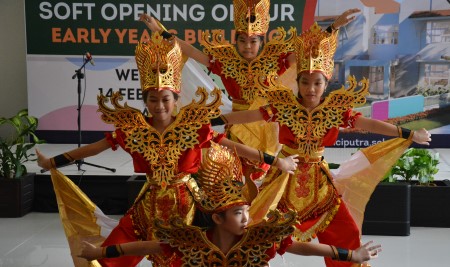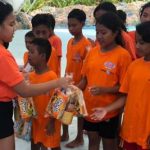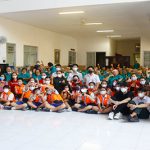Dear Parents,
I hope you enjoyed the long weekend with family and friends.
The soft opening of our new Pre-Elementary building was a resounding success. It was wonderful to see so many parents and students using the building! We will start moving classes into the building over the mid-semester break and it is planned that by the fourth term all our Pre-Elementary classes will be relocated.
Mr Alan Yip will be holding two parent seminars this Friday in the new Pre-Elementary building. These are informative, fun and free. You will need to reserve a seat by contacting any of the Admin Offices’ at the school. Thanks toA�MARCOM and the PSG for organising these fantastic workshops.
Tomorrow we will host delegations from the City of Surabaya and schools in Busan, South Korea. We are very proud that the local Ministry of Education officials chose our school to host the visit. I would like to thank the parents who are supporting this event by hosting the visiting Korean students.
I want to finish off by reflecting upon the idea of learning from mistakes. We are a large organisation with 1300 students. It is inevitable that from time to time people will make mistakes and/or errors of judgement. Making mistakes is part of being a human being. We teach two things at the school. Firstly, we work hard with our students and staff to share a positive vision of good relationships and encourage them to make good judgements.A� Secondly, when a mistake is made, we encourage reflection and owning the consequences of the mistake as well as embracing the learning opportunities that making a mistake gives us.
The Science Behind Mistakes
Telling students they need to take advantage of the feedback they get isn’t just good advice — it’s established science. In the last few decades, researchers have discovered a lot about how people become experts. The main idea, made popular by everyone from author Malcolm Gladwell to rapper Macklemore, is the 10,000-hour rule. Ten thousand is the number of hours it takes to become an expert in almost any field. While it’s wonderful that people are starting to understand how work leads to expertise, the most important part of that research is notA�how much practiceA�someone needs to perform, butA�what kind of practice. This latter category is calledA�deliberate practiceA�and involves isolating what’s not working and mastering the difficult area before moving on.
Picture a classical violinist rehearsing. He or she would not play a new piece start-to-finish, fudging through tricky sections and trying to “be done.” That musician stops in trouble spots, figures them out, and then plays that measure over and over again, and only moves on when it’s perfect. The same principle applies to schoolwork.
Mistakes are the most important thing that happens in any classroom, because they tell you where to focus that deliberate practice.
So why don’t students view their mistakes as a valuable asset? Well, students don’t think about their mistakes rationally — they think about them emotionally. Mistakes make students feel stupid. “Stupid” is just that: a feeling. Specifically, it’s the feeling of shame, and our natural response is to avoid its source. If we say something embarrassing, we hide our face. If we get a bad grade, we hide the test away. Unsurprisingly, that’s theA�worstA�move to make if you ever want to get better. Academic success does not come from how smart or motivated students are. It comes from how they feel about their mistakes.
* Extract from “Teaching Students to Embrace Mistakes – Hunter Maats and Katie O’Brien
Have a great week.
Martin Blackburn
Executive Principal







